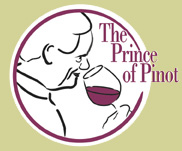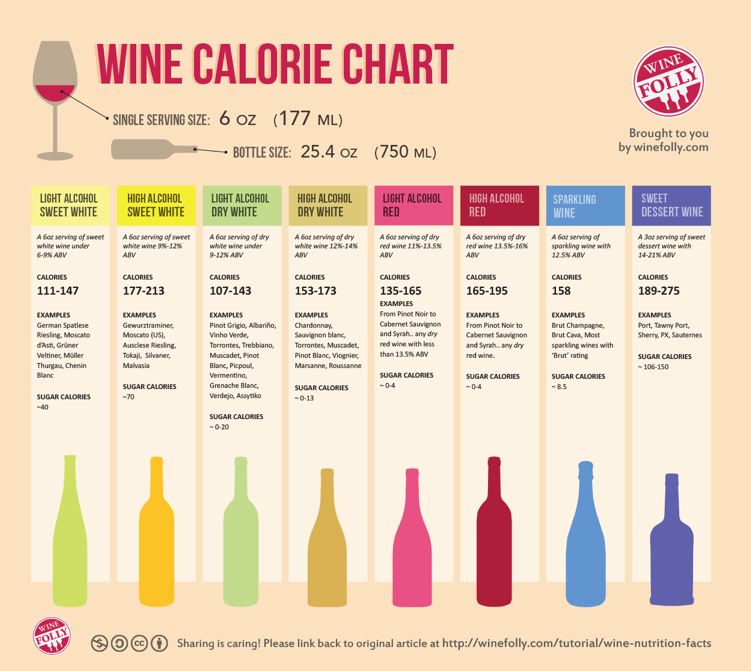Alcohol and Weight Gain
A single serving size of 6 ounces of wine has about 111-275 calories (the amount will vary depending on the
type of wine and its ABV). Refer to the chart below from www.winefolly.com/tutorial/wine-nutrition-facts. A
standard 12 ounce serving of beer has 150 calories as does a 12 ounce serving of Coke.
Claims that drinking alcohol will make you fat continue to grab the attention of the public. Many nutritionists
advocate avoidance of alcohol. They reason that since alcohol is high in calories it therefore must cause weight
gain. Adding the calorie content to wine labels as is currently required on food labels has been proposed in the
U.S., but so far nutritional label requirements have not been passed into law.
The research into the effect of alcohol on weight is inconclusive, but many scientific studies show that liquid
calories from alcohol are metabolized differently and not bioavailable. A 2002 study by researchers at Kyushu
University in Japan determined that alcohol improves insulin sensitivity. In other words, drinkers process
complex carbohydrates more efficiently and store less fat.
A report in the drinksbusiness.com (February 11, 2015) pointed out that a phenomenon known as "drinkorexia" is becoming more prevalent. Drinkorexics swap their food calories for alcoholic drinks, a result of the increasing availability of information on the caloric content of wine, beer and spirits. The calorie information is potentially harmful to those with eating disorders.
Science writer, Tony Edwards, in The Good News About Booze (2013), dispels the myth that drinking alcohol
makes you fat. He cites at least sixteen epidemiological studies over the past 25 years that have consistently
shown that wine drinkers, especially social or moderate drinkers, do not gain weight and even gain less weight
than abstainers. Some studies even found that alcohol was “slimming” (don’t take this to suggest that drinking
is a recommended weight loss method). It is true that alcohol can increase your appetite, cause you to loose
self control, and lead you to eat not only more food but less healthy food, but this is an indirect effect of alcohol
on weight change.
Beer bellies in heavy beer drinkers are often cited as evidence of alcohol-induced weight gain, but Edwards
points out that beer contains malt sugar or maltose and has a high Glycemic Index. Heavy drinkers tend to eat
excessively as well. No research has been done to explain whey wine drinkers do not develop an increased
waist size.
Jill U. Adams presents a discussion of the subject in the Washington Post (www.thewashingtonpost.com,
October 22, 2014, “Is drinking alcohol going to make you fat?”) and admits, “The science is murky.” She cites
several studies that support the conclusion that moderate drinkers tend to gain less weight over time than
teetotalers, and quotes alcohol expert David Hanson at the State University of New York at Potsdam. “There’s
every reason to believe people who drink alcohol will gain weight, but they don’t.”
The takeaway message here is that you can enjoy wine in moderation without worrying about gaining weight
as long as you maintain a proper diet and perform regular exercise.
A Denver-based company, BeverageGrades®, offers a website with nutritional and flavor data on more than
5,000 wines including calories, sugar, carbohydrates, antioxidants, histamines, sulfites, vitamins, gluten,
pesticides and most flavor compounds. This is the first company to offer this nutritional information on
alcoholic beverages. The company’s independent lab extracts the chemical DNA of wines, beers and spirits
sold in the United States and a chemical fingerprint of each beverage is created including scientific taste and
aroma characteristics. Consumers can access this information on the website or by use of a mobile app.
Consumers are able to enter their favorite wine and find other wines with nearly identical chemical composition,
as well as similar flavor, aroma and taste profiles at different price points. When I visited the site, I could not
find information on most of the wines I review for the PinotFile. You will have better luck with larger, more
widely distributed wine brands. Visit www.BeverageGrades.com for more information.



